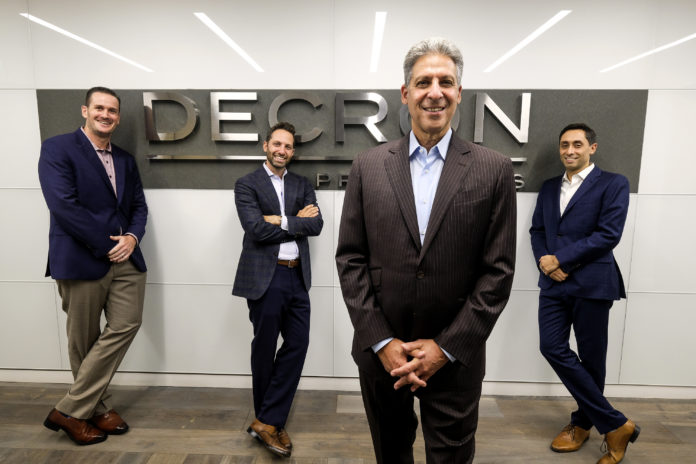For Mid-Wilshire-based developer Decron Properties Corp., family is key.
The company is run by David Nagel, as chief executive and president, and his nephews Daniel Nagel and Zev Nagel, who serve as chief financial officer and executive vice president of administration respectively.
Chief Operating Officer Joe Coleman isn’t technically family, but David Nagel said he might as well be.
“This family-owned company, multigenerational company is something I’m very proud of,” David Nagel said. “It is the four of us that work very, very closely as a team together with all of our team members.”
His father, Jack Nagel, a Holocaust survivor, founded Nagel Construction Co. in 1952 as a single-family home developer building tract houses in areas like the San Fernando Valley. He built more than 2,000 homes.
David Nagel joined in 1981 as the business started to diversify into apartments.
“I really liked the multifamily and income property business much better than housing,” he said adding that the ’80s were a hard time to sell homes because interest rates were high.
“Investing in income properties, you have potentially another bite of the apple. If you are properly leveraged … you can ultimately hold on to it through a recession and then have another bite at it,” Nagel added.
The multifamily business started with just a handful of properties. Today, the company has 44 multifamily and eight office and retail assets.
In 1988, the same year David Nagel became chief executive, the business changed its name to Decron in a nod to all of Jack Nagel’s children: David, Esther, Careena and Ronnie. The name change coincided with the company’s shift from a general contractor and construction company to a real estate investment company.
Multifamily focus
When Daniel Nagel joined the firm in 2009, its holdings were 60% in multifamily properties and 40% in office and retail assets.
He said the Great Recession made it clear that multifamily was a better asset class to be in.
“We saw a minimal drop in our multifamily portfolio. It had a shallower drop and a better recovery,” Nagel said. “Retail had a more significant drop and a longer recovery.”
The company’s portfolio is now 85% multifamily.
“Multifamily has longevity and stability,” Nagel said, adding that as long-term property holders, multifamily is a better investment.
In the last decade, Nagel said, the company has grown in terms of revenue, employees and the number of properties it owns.
And during the Covid-19 pandemic, he added, being more heavily invested in multifamily as opposed to retail buildings has been a plus.
“In Covid-19, all poverty types are challenged while retail is the most challenged, and we are grateful to have executed on the strategy,” he said.
Go Western
At first, all of Decron’s properties were within a 50-mile radius of its headquarters, but the company has gradually expanded its reach.
Decron made its first purchase outside of Southern California, a property in the Bay Area, in 2015. Earlier this year it paid $72 million for a property in Fremont, its sixth site in the area.
Decron also made purchases in the Pacific Northwest in 2018 and 2019.
“We continue to look in California and Washington,” Coleman said, adding that Decron was also considering other markets in the West, such as Denver, Salt Lake City and Phoenix.
“We are looking to expand outside of California,” Coleman added. “We are opportunistic, but it has to be the right market fundamentals.”
Growth strategy
David Nagel said the company “always planned for trouble,” which will allow it to do well during a recession. “We knew that it was coming. As a fundamental structure within our company, and part of our ultimate strategy, is leverage. We are always very careful in watching our leverage. We want to be able to ride out a recession.”
Leverage, which the company uses to finance properties, accounts for about 52% of Decron’s portfolio, he explained.
“Because of that, we can take this hit,” David Nagel said.
He added that about 20% of Decron’s retail tenants are delinquent, but because the company is not more leveraged it can do well despite the loss in rent.
And Decron is looking to grow.
“We continue to look mostly for multifamily o
He added that the company was open to retail and office investments, but it would have to be “the right opportunity. We are opportunistic investors.”
For multifamily properties, the company is interested in assets in stabilized employment or growing employment areas with upward job mobility. Decron is also looking to be in areas with good school districts and transportation.
And in the next five years, Zev Nagel wants the company to have 10,000 units. He has focused on growing the company’s operations and platforms, which he said will make it easier to set up in other cities.
“It gives us the ability to continue to grow and move up to that 10,000-unit ladder,” he said.

